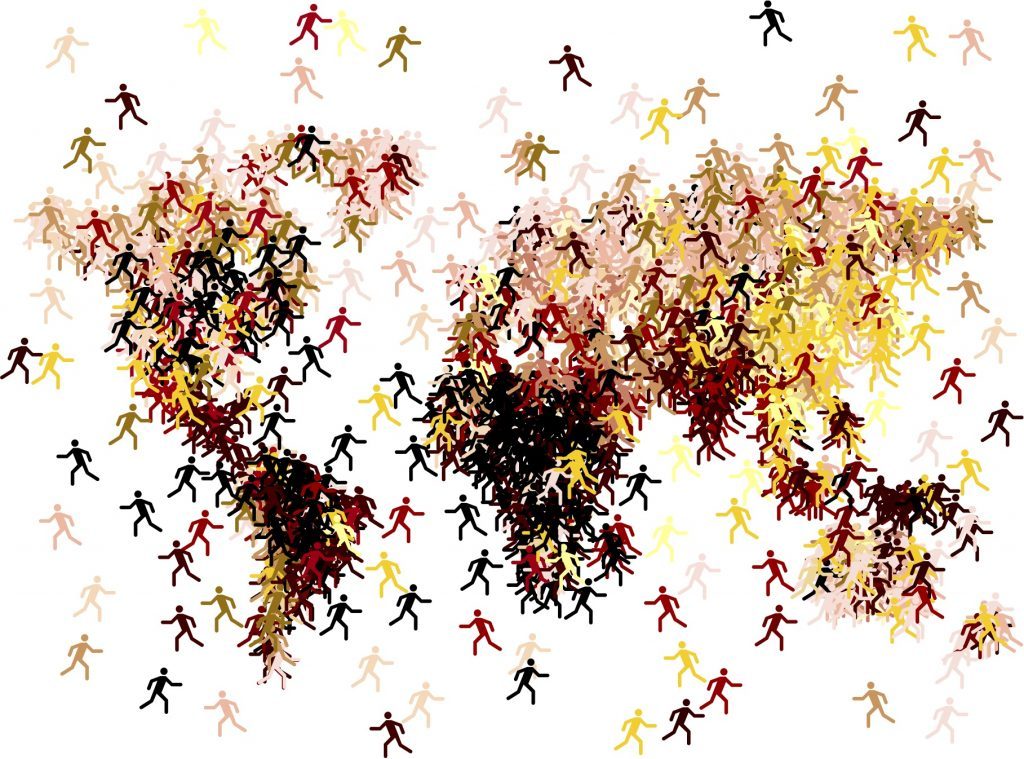Alp Mehmet and his organisation Migration Watch, a self-described non-political think tank, have long been the thorn in the side of both the British Establishment and the progressive left. Now, feeling betrayed by Brexit promises as immigration continues to ‘spiral out of control’, it seems the cry of ‘they’re taking our jobs’ might turn into ‘they’re taking our land’.
In an article Mehmet wrote recently about how ‘out of control’ immigration is the cause of the UK’s housing crisis, he states that migration is going back to, or exceeding, pre-pandemic levels and would prove disastrous for housing demand.
- Rachel Trafford writes for the Immigration Advice Service.
Using ONS figures, Migration Watch shows projections for ‘zero migration’, ‘principal’ and ‘high migration’ scenarios. Household numbers would increase by 2, 3.7 and 4 million respectively over the next 25 years. They claim just over half of extra homes needed in England by the early 2040s will be a result of immigration, a difference of 2.69 million homes by 2043.
Mehmet is chasing bogey men.
The Office of National Statistics even state themselves ‘it is not possible to predict future migration trends’. These projections are based on averages that include record levels of migration from the early 2000’s that haven’t been seen since.
The ONS also predicts that total net migration between now and 2025 will actually decrease and plateau to around 190,000 each year. In a recent study, it was shown over a million foreign-born people have already left the UK in 2020, the biggest fall in Britain’s population since WWII. Researchers at the Economic Statistics Centre of Excellence stated the pandemic, and the job losses it has caused, has fallen hard on the migrant population. With European citizens now needing visas to stay in the UK to work, harsher regulations brought in by Brexit may also be a factor.
The different projections ONS use are a direct result of ‘the considerable level of uncertainty’ facing migration to and from the UK. Effects of Covid-19, Brexit and any economic fallout will keep things in flux, no matter how loud Migration Watch may call for the drawbridges to be pulled up.
The power of a bogey man though, is its ability to shape shift, especially in times of uncertainty. Migration Watch arguments therefore continue to rail against the weakness of the immigration system despite the end of the Brexit process. Scaremongering social media graphics about the volume of people crossing the English Channel in boats, stating ‘you’re being lied to’ while total migration numbers are actually falling show EU free movement was never their real gripe in the first place.
Simultaneously highlighting numbers of people crossing the Channel, while warning of the threat to ‘our greenbelt land’ and housing levels, is not only misleading but a dangerous dog whistle.
In mirroring the well-known hymn Jerusalem and walking on ‘England’s mountains green’, their rhetoric speaks to an idyllic idea of freedom. While the loss of green spaces to development does happen, linking that fact to immigration, the question is of entitlement to that space, and access based on categories of ‘foreigner’ and ‘native’.
Of course, Migration Watch and its work is primarily the project of just one man. However in a recent Home Affairs Committee Hearing on people crossing the channel, as a past foreign diplomat, Mehmet was given equal standing on the issue as immigration lawyers. In some bleak irony, their offices are based just two minutes walk from the Home Office at the heart of Westminster. The shift to the right in UK politics and the uptick in outright hostile rhetoric shows these views are no longer on the fringes, but in the heart of government and its policies.
With 98,000 families in temporary accommodation, and 1.6 million people in need of social housing, blaming a housing crisis on immigration misses the fact that the two combine into a toxic loop, each continually feeding the other. In recent days, it has been reported that plans for 127 new social housing homes on an unused site in Durham are now to be scrapped to build an immigration detention centre instead. Hundreds are currently struggling in completely unsuitable sites, such as barren ex-army barracks in Penally and Napier, in immigration detention in all but name while they endure the wait for a decision on their claim.
‘England’s pastures’ aren’t under threat from immigrants, but from a dangerously deregulated and predatory housing sector. Focusing on the former distracts from the closer examination of systems needed to solve problems. Central government have cut funding to provide quality affordable social housing by over 80%, and weaponised an immigration system to marginalise and criminalise those who arrive here to the detriment of those individuals but also the country at large.
Migration Watch states that house building last year was ‘at a 30 year high’, failing to mention that the vast majority are priced far out of most peoples’ budgets, including those who migrate. In 2019 for example, there were only 6000 social or affordable homes built nationally.
Contrary to popular belief, there is no ‘queue jumping’ for social housing for those from overseas. The Equalities and Human Rights commission found this myth was in-fact caused by a reduction in social and affordable housing stock, with such large amounts of previously council owned property now in private company hands. Foreign investors and private contractors line their pockets and buy up new property whileover half a million homes are currently standing empty in the UK, as austerity has also gouged holes in funding to bring them back into use.
An end to failed austerity and hostile environment policies that impoverish people at increased expense and damage to the state is the only way out. Policy and discussion about who has access to space and shelter in post-Brexit Britain can’t be based on ideas of entitlement and exclusion. How we can make housing available to all as a public health need and a human right should be everyone’s concern.







